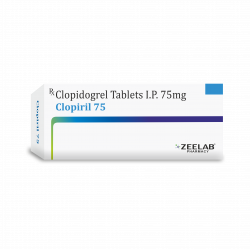Clopidogrel
Clopidogrel is an antiplatelet medicine commonly used to reduce the risk of heart attack and stroke in people with heart disease or blood circulation issues. It works by preventing blood clots from forming, thereby keeping blood flowing smoothly through the arteries. Often prescribed after a heart attack, stroke, or certain heart procedures, Clopidogrel helps protect the heart and brain from future complications. It is usually taken as a tablet once daily and is often part of long-term treatment plans.
Uses of Clopidogrel
- Prevention of heart attack in people with heart disease
- Prevention of stroke in patients with previous stroke or mini-stroke (TIA)
- Used after stent placement or heart surgery to prevent clot formation
- Treatment of peripheral artery disease
How Clopidogrel works
Clopidogrel works by inhibiting platelets in the blood from clumping together to form clots. It blocks a specific receptor (P2Y12) on the platelet surface, reducing the risk of clot formation, especially in narrowed arteries, thus lowering the chances of heart attacks and strokes.
Benefits of Clopidogrel
- Reduces the risk of serious cardiovascular events
- Helps prevent future heart attacks and strokes
- Improves blood flow in patients with circulation disorders
- Essential post-surgery medication to prevent clot-related complications
How to take Clopidogrel
Clopidogrel is usually taken orally once a day, with or without food. It’s important to take it at the same time each day for the best results. Do not stop taking it without consulting your doctor, even if you feel well. Always follow the dosage prescribed by your healthcare provider.
Type of Dosage Available
- Tablet – 75 mg
- Tablet – 150 mg
Side effects of Clopidogrel
- Bleeding or bruising more easily
- Stomach pain or indigestion
- Diarrhea
- Headache
- Rash or itching
- Serious but rare: internal bleeding, allergic reactions
Safety Advice
- Inform your doctor if you have any bleeding disorders
- Avoid activities that may increase the risk of bleeding or injury
- Use caution when combining with other blood thinners or NSAIDs
- Not recommended during pregnancy or breastfeeding without medical advice
- Regular blood tests may be needed to monitor clotting function
Frequently Asked Questions (FAQs)
Q: What is Clopidogrel used for?
A: Clopidogrel is used to prevent blood clots that can lead to heart attacks, strokes, and other serious cardiovascular issues.
Q: How long should I take Clopidogrel?
A: Your doctor will decide the duration based on your condition. It is often prescribed for long-term use.
Q: Can I stop taking Clopidogrel if I feel better?
A: No, stopping Clopidogrel suddenly can increase your risk of blood clots. Always consult your doctor before making changes.
Q: Does Clopidogrel interact with other medications?
A: Yes, especially with blood thinners, NSAIDs, and certain antidepressants. Inform your doctor about all medicines you are taking.
Q: Where can I buy Clopidogrel?
A: You can buy Clopidogrel from Zeelab Pharmacy at the best price with a valid prescription.
Related Salt
Download India's most affordable pharmacy app
- Compare with medicine prices
- Save upto 90% on your medicine bills

Temperature Controlled storage and delivery

Regular Sanitization

Disinfected Packaging















 Added!
Added!